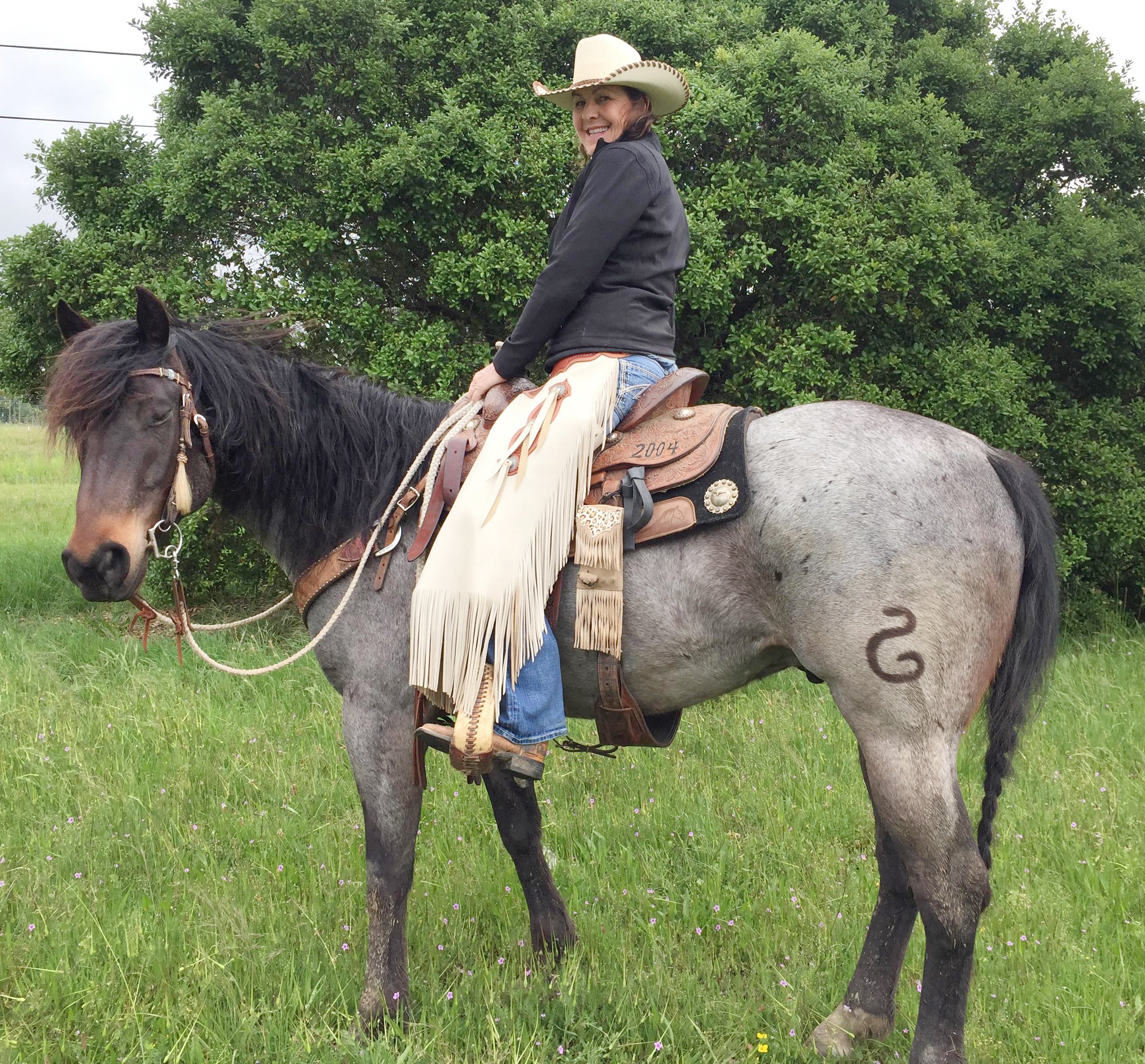
Horses have literally been therapy for champion American roper Kellie Mackin.
Devastated when she was diagnosed with leukaemia, she was given a 30% chance of survival by oncologists.
Lying in hospital, she started "willing" her beloved horses, listing who would inherit them. But then she put down her pen, having made the decision that she was going to live and take care of them herself.
That gave her strength and, when she got out of hospital, all she wanted to do was go to the barn and see her horses.
But she had whittled down to "barely skin and bone", with no muscle, and she got only as far as a hammock, a short distance from the house, before falling asleep for several hours.
Following chemotherapy and while waiting for a bone marrow transplant, she got enough strength to ride and managed to get on a horse at her roping trainer's property.
Bald from the hair loss caused by the chemotherapy, she braided some hair to stick inside a baseball cap.
But the first time out of the box, she lifted her arm and knocked the cap off. So she put it back in the truck and put on a beanie, declaring she was "going to rope".
Before the diagnosis, Ms Mackin said she felt like she was always "just running" - never slowing down to take care of herself, but "running through life".
While the illness slowed her down physically, it made her aware there was more to life and encouraged her to "be a little more present" with her friends.
She also felt there was a purpose for her, and coaching riding and roping seemed to be that purpose right now, although she was sure there would be many more purposes along the way.
Ms Mackin, who is in her 50s, grew up in a town in southern California called Norco, which has the nickname Horsetown USA.
To this day, she said, it still had more horses than vehicles and at the local Starbucks, you could ride your horse up to the window to be served and there was a pen provided if you wanted to dine inside.
While at high school, she moved to Clovis, in central California, another strong agricultural and horse town.
Ms Mackin grew up around horses and they were a lifelong passion but it was not until about 2001 that she got serious about roping. She had been involved in other disciplines, including barrel racing and three-day eventing.
After carrying the American flag at the Salinas rodeo for seven years, and watching the ropers, she wondered why she was carrying a flag and not roping.
Her father was a team roper, to which she attributed her desire to take up the sport. But father and daughter were left-handed and learning to rope with her right hand was "as hard as heck".
When she started roping, her goals were to win saddles in the US team roping championships and the Women's Team Roping Association championships.
She won her first US saddle in 2009 after her battle with leukaemia, and ticked off her other goal in 2014.
From there, her goal was to win a World Series team-roping buckle and saddle. She has won the buckle but has not yet won the saddle - and that is the "big box to check off".
She has qualified for the finals - with a $100,000 prize - in Las Vegas three times but has been "always a bridesmaid, never a bride".
"I'll get there; I'll keep going until I get there," she said.
Ms Mackin lives with her fiance, Frank Nunes, at Bear Creek Ranch, in the San Francisco Bay area, about 30 minutes from San Francisco.
The cattle ranch used to belong to Mr Nunes' grandfather and the couple live in an "adorable" farmhouse that is more than 100 years old.
She teaches riding and roping to both children and adults and has a very busy after-school programme with between 10 and 12 children daily. She also has a summer camp programme, attended by between 22 and 25 children.
Before attending college, Ms Mackin always said she was going to become a teacher. But once she got there, she realised teaching did not make much money.
So she majored in accounting and business and got into the pharmaceutical industry, selling drugs. Teaching doctors about drugs still felt like teaching, she said.
But teaching children to ride was particularly satisfying, she said.
"It's just really gratifying to teach these kids and share this passion. They are there because they love horses as much, probably, as I do. That gets me very excited."
She lives a busy but very "wholesome" lifestyle alongside her 25 "and a-half" horses - one is a miniature horse.
"Horses bring a lot more to the table than people realise. They are therapy," she said.
This will be Ms Mackin's third trip to New Zealand and she is hoping for an improvement on her one roping run two years ago at Waikouaiti, which "didn't go very well".
She said New Zealand rodeos were more like the many jackpot rodeos that were held in the US, but there was a "real top end" of cowboys and cowgirls in New Zealand, just like the top competitors in the US.
When it came to roping, there might be 30 teams at a rodeo, whereas the last rodeo she competed at in the US had 225 teams and that was only a jackpot.
Her biggest achievement was at the national finals about three years ago, when she and her partner placed third out of 1100 teams.
"That was a huge accomplishment. We were like two little kids," she said.





















